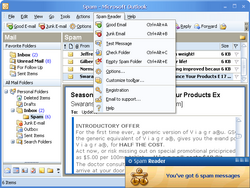Software:Spam Reader
 | |
| Developer(s) | LuxContinent |
|---|---|
| Stable release | 2.6
/ December 8, 2008 |
| Operating system | Microsoft Windows |
| Type | Email spam filter |
| License | Shareware |
| Website | www.spam-reader.com |
Spam Reader is a free anti-spam add-on for Microsoft Outlook,[1] produced under shareware license. The program uses content filtering based on a Bayesian spam filtering algorithm, white-listing and blacklisting techniques, additional spam signs such as embedded images, attached executed files and junk text.
Environments
The program supports : Post Office Protocoll, Internet Message Access Protocol, HTTP and Microsoft [Exchange]. For Microsoft Exchange the program works only with default mailbox. HTTP mailboxes are limited to those supported by Outlook. The program is an add-on, and automatically integrates into the Outlook workspace.[2]
Techniques
White List – The program guarantees that the messages from user's regular correspondents will not be blocked as spam even if their contents look like spam. The White List may include names, addresses or entire domains. The list is automatically created on the first program execution by scanning a user's address book, contacts folder and all saved sent messages. The program automatically updates the White List adding information about the recipients of outgoing messages.

Black List – the program contains contacts and email addresses from where you can receive spam or any other unwanted messages. Spam Reader will consider any message with a sender from this list as spam. Black List items may be names, email addresses and entire domains and can contain wildcards.
Safe Recipients List – This list contains email addresses from which user can't receive spam and all messages sent to these addresses should be always treated as legitimate messages.
Bayesian Spam Filter – Spam filtering is based on Bayesian statistics. Using this algorithm, the program scores each message corresponding to the probability for a particular message to be spam. Regular updates and self-training option, make the filtering algorithm very flexible.
Custom Filter – To adjust the filtering rules to a user's personal needs it is possible to define custom Spam and Not-Spam Dictionaries. If a message contains a word or phrase from Spam Dictionary, then it is considered as Spam. Messages containing a word or phrases from Not-Spam Dictionary will be directed to Inbox without further anti-spam filtering.
Outlook Rules compatibility
The program uses a special algorithm for interaction with Microsoft Outlook Rules. This algorithm allows the user to set the order of executing Outlook Rules and Spam Reader. This prevents chaotic movement of spam messages between the Spam folder and the destination folder for some Outlook Rule in case the spam messages match up with this Rule.
References
External links
- User review of Spam Reader at www.snapfiles.com
- Editor review of Spam Reader at www.email.about.com
- 5 cows by Tucows
- Spam Reader – Spam Filter for Outlook – Home Page.
- Short information about Bayesian filtering
- Outlook anti-spam add-on installation. Details.
- Microsoft Exchange Compatibility. Details.
- Articles About Spam – Collection of articles.
